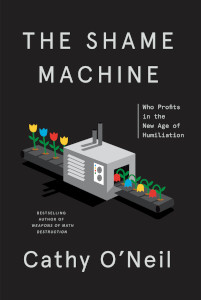Author explores society and shame in new title
Posted by Elena del Valle on April 17, 2024

The Shame Machine
Photo: Penguin Random House
In The Shame Machine Who Profits in the New Age of Humiliation (Crown, $27), Cathy O’Neil, known for her previous book Weapons of Math Destruction, and Stephen Baker discuss their beliefs about shaming in society, especially via social media, and its effects on those targeted. The authors point to obesity, gender identity, possible body odor, addiction, poverty, political views, incels and hikikomori (a form of recluses in Japanese society) and age among the favorite subjects of those who shame people.
They say in that book that although shame may at times be used for social benefit, such as during the early years of covid to shame people into wearing masks and being vaccinated with an experimental vaccine, and to correct injustice; they believe it has increasingly become weaponized as a means to belittle the more vulnerable in society. They point to corporations, in particular Google and Facebook, and social media as the ultimate financial beneficiaries. In the case of hikikomori the financial motives may be less obvious although there are businesses dedicated to removing the recluses from the midst of their families, for a fee.
Most of us, the authors say in the chapter on humiliation and defiance, even if we are unaware, are likely to participate in shaming events. In the chapter on punching up they explain that punching up works when there is a choice and a voice. In that same chapter they explain that “shame is a toxin.”
They believe everyone should look at every aspect of life from the perspective of shame. They favor reparations for past wrongs. In lieu of shaming they propose an innovative approach to addiction: offering addicts a financial reward to visit methadone clinics; and giving money to the poor with no strings attached. A source of funding for these ideas was not evident.
The 255-page hardcover book published in 2022 is divided into 10 chapters in three main sections: Industrial Shame, Networked Shame and Healthy Shame. According the biography in the book O’Neil founded an algorithmic auditing company. In one case described in the book the work of her company (she was approached as an expert in “algorithms and crime risk scores) resulted in the release of a sexual predator convicted of raping an elderly woman. O’Neil wrote or co-wrote Doing Data Science and On Being a Data Skeptic.









